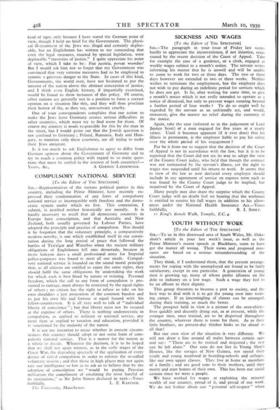SICKNESS AND WAGES
[To the Editor of THE SPECTATOR] SIR,—The paragraph in your issue of Friday last seems hardly to appreciate the inconvenience, if not injustice, occa- sioned by the recent decision of the Court of Appeal. Take for example the case of a gardener, or a clerk, engaged at weekly wages subject to a month's notice. The servant writes informing his master that he is Unwell and will be unable to come to work for two or three days. The two or three days however are extended to two or three weeks. Neither wishes to terminate the employment, but the employer does not wish to pay during an indefinite period for services which he does not get. Is he, after waiting for some time, to give a month's notice which is not really intended to operate as a notice of dismissal, but only to prevent wages running beyond a further period of four weeks ? To do so might well be regarded by the servant as an unfriendly act, and would, moreover, give the master no relief during the currency of the notice.
Again, take the case (referred to in the judgement of Lord Justice Scott) of a man engaged for five years at a yearly salary. Until it becomes apparent (if it ever does) that his illness is permanent, is the employer liable to pay his salary over the whole period of his engagement ?
Far be it from me to suggest that the decision of the Court of Appeal is not in accordance with the law, but it is to be regretted that the Court did not see its way to adopt the view of the County Court judge, who held that though the contract was not terminated by the servant's illness, yet the right to wages was suspended until his return to work. It seems that in view of the law as now declared every employer should include in any agreement of service an express term such as was found by the County Court judge to be implied, but negatived by the Court of Appeal.
Many people may also share the surprise which the County Court judge will no doubt feel on hearing that the workman is entitled to receive his full wages in addition to his allow- ances under the National Health Insurance Act —Yours
faithfully, R. I. SIMEY. rr King's Bench Walk, Temple, E.C.4.










































 Previous page
Previous page